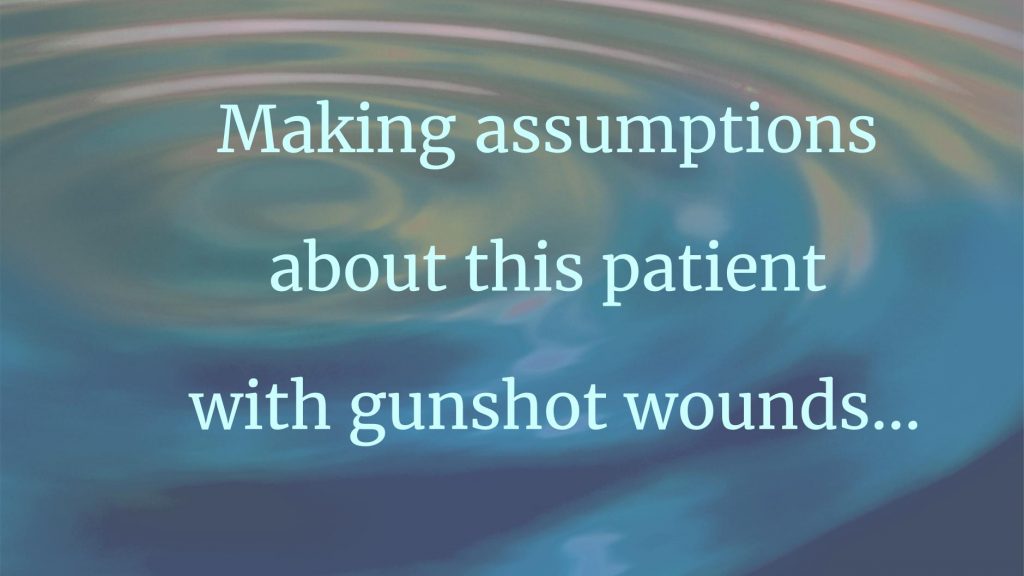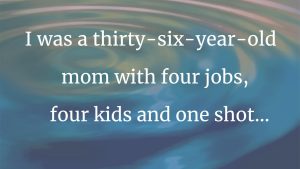If harsh words fall, but no patient is around to hear them, do they make a sound?
This particular night on my trauma-surgery rotation as a fourth-year medical student, the question weighs heavily as a page alerts the team that a patient with multiple gunshot wounds will arrive in ten minutes.
Everyone’s kind of excited. Anxious, too. Jittery.
1:00 am. Down in the ED, the main actors stand masked, gowned and ready to go. ED Cowboy stands at the head of the bed, Surgery Senior stands to the side. Alongside them, the throngs of people without obvious purpose who always seem to show up just in time for the evening’s episode of “drama in the trauma bay.” Everyone’s done this a thousand times before. Well, maybe not everyone.
“TRAUMA’S HERE.”
While the EMT’s giving the report, we unstrap Guy (in the computer, his name is “Disaster,” because we don’t know his name). He’s yelling so loudly that we can’t hear the EMT, but I guess he has good reason.
The stars of the show launch into the ABCs of trauma care.
A: Airway.
“What’s your name, sir?” ED Cowboy yells. Guy says something incoherent about being in pain.
“Airway’s intact.”
B: Breathing.
Surgery Senior wastes no time: “Got bilateral breath sounds.”
C: Circulation.
Guy’s blood pressure starts dropping. And he’s quieter. Now quieter doesn’t seem so good. He’s not protecting his airway very well. And his blood pressure’s dropping. And his feet are cold. And it doesn’t take the impressive prowess of a fourth-year med student to see that he’s bleeding into his increasingly distended belly. And bullet holes, at least new ones, look so much less…painful and deadly than you’d think.
And his blood pressure keeps dropping.
ED Cowboy gets ready to intubate him, and, like it was scripted that way, Guy codes.
“Starting chest compressions.”
Got a pulse back.
Boss Surgeon steps up to the table. She’s short, and it’s loud, so she has to yell.
“IF WE’RE GOING TO MAKE IT TO THE OR, WE NEED TO CROSS-CLAMP. EVERYONE WHO IS NOT ACTIVELY RUNNING THIS TRAUMA NEEDS TO STEP BACK. WE NEED A THORACOTOMY KIT.”
Sad news for everyone enjoying the show–it’s not a bad story, unless you’re Guy.
This is the second ED thoracotomy in two weeks. Boss Surgeon says it’s her second one in ten years. The likelihood of surviving an ED thoracotomy after gunshot wound? 4.3 percent. That’s what Boss Surgeon said after her first one, last week.
Just like it had a zipper, Guy’s chest is opened, and we’re staring at his frantically beating heart through the gaping space between his ribs.
Aorta’s clamped. Praise the Lord.
We all race through the hallway–Boss Surgeon, Surgery Senior, Surgery Junior, Respiratory Therapist and Guy, of course–like the Jamaican bobsled team in the final stretch.
Everyone scrubs quickly. I say a little prayer, not even sure who it’s for.
Surgery Junior raises her eyebrows at me. “Danielle, get ready with the sucker. There’s going to be a lot of blood.”
She’s not wrong. Guy’s belly dumps liter after liter of blood and poop faster than we can yell “Towel!” at Scrub Tech. 2:00 am ticks to 3:00 am as six units of transfused blood turn into thirty.
White Queen Surgeon rolls in–guess Boss Surgeon needed some help. You can tell White Queen’s hair used to be blonde, but she’s the sort of lady who could have been born with white hair–just full of wisdom and secrets.
Eyebrows furrowed on her kind face, she says, “What happened to this gentleman, anybody know?”
I wish she hadn’t asked. The OR erupts into a choir of sensationalist speculations.
Does it even matter? I think. No way we could know the whole story anyway. Not sure anyone really wants the whole story…probably just the good parts.
4:30 am. Guy’s out of OR and in the ICU. His family is gathered in his room with the White Queen. She tells them that he has needed another ten units of blood since arriving in the unit. No one can keep up with how much he’s losing.
5:30 am. The daytime team creeps in, bringing the morning with them. In the solace of the workroom, it’s time for sign-out. Guy is the only patient without a sign-out note. Partially because his name is still “Disaster” in the computer; partially because no one has been sure how Guy’s story would unfold.
The White Queen interrupts sign-out to inform us that Guy’s family has decided to stop life support. No need to sign him out.
As the night team prepares to leave, Plastic Surgery pipes up. She’s on the day team. It’s apparent that she much prefers Plastic Surgery world to the ICU.
“Oh my GAAAAHSH, y’all, he lives in the neighborhood next to mine! Isn’t that scary?” She sounds like a character from Mean Girls.
Ortho turns around in his chair, already faithfully attending to filling out Guy’s death packet.
“I don’t think you need to be worried about that,” he says. “He probably has different extracurriculars than you do, if you know what I mean. I’m sure he wasn’t just sitting on his front porch reading his Bible.”
Guy couldn’t hear Ortho; in that moment, he couldn’t have been farther away. But as those words fell, the sound they made was piercingly louder than all the noise Guy had made as he yelled what would be his last words in the ED hours earlier.
To translate, Ortho is saying that people out there like Guy don’t have the same “extracurriculars” as the people in here, in the workroom. They just can’t–because if they do, then the people in the workroom aren’t so safe anymore. And what’s more, people like Guy couldn’t possibly read their Bibles. Because anyone with their nose in a Bible, covered in the love of Christ, would have been above–no, impervious to–the kinds of things that shatter lives, like bullets.
No one in the room knows Guy’s story, but no matter–his narrative is now etched into everyone’s minds as permanently as the Philippians 4:13 “I can do all things through Christ” tattoo on Guy’s chest. With those words, it’s finished: Ortho, Plastics, Surgery Senior, Boss Surgeon and everyone else–are safe from the kind of life that happens to Guy.
Well, maybe not everyone. Because there’s always a chance that someone in the room isn’t so different from Guy.
Someone whose name sounds more like “I” than “Guy,” more like “Danielle” than “Disaster,” who came in as a “red trauma with multiple GSW” many years earlier, at a different hospital. Only now, she’s someone who also shares remarkably similar extracurriculars with Ortho and Plastics and Surgery Senior–namely, that of finding safety within the walls of the hospital workroom, writing other people’s stories for them. That is, until the walls separating the people in here from the people out there are shown for the smokescreen they always were.
Because for all our attempts to get as far away from Disaster as possible, it’s not clear when someone whose extracurriculars are similar to yours–someone who’s sitting in the next seat over, or standing beside you at the operating table, or reading the Bible just this morning–is also kind of like Guy.
So unclear that until the last reinforcements of that façade of a workroom fort come down, even I forget–I’m Disaster, too.









15 thoughts on “Extracurriculars”
Very well-written, evocative essay. I hope you continue to write about your experiences as a physician.
Wow! This is one of the most powerful stories I’ve read in a long time. Thank you.
And no one said in response, Guy could have a been a young black man who was jogging, bird watching or sitting in his car reading a book, and maybe a lawyer, or a doctor, or an engineer, who just happened to be living while black when someone decided that wasn’t OK. His extracurriculars could have been the same as those in the workroom except that he was black….and someone decided he didn’t belong wherever he was.
I don’t know how the “death packet” is related to “extracurriculars”.
If I did I guess I’d know how that signaled disparagement.
Did you and the team feel let down that the family decided to withdraw life-support after the frenzied intense try to put him back together? Would you want to know that at the beginning?
Strong piece.
As a “reformed” trauma surgeon I found this piece powerfully written and evocative. As Maimonides supposedly said, “In the sufferer, let me see only the human being.” . . . . and not just another “Guy”!
I have been reading Pulse since shortly after its inception, and I have never read anything that touched me so. The skill of the language carrying the depth of the message – wow! Thank you Danielle
Thank you, Danielle, for shining a brilliant light on some of the dark places within us–as individuals and as professional healers and caregivers. It would surprise me if anyone reading your piece did not nod their head in recognition and find themselves wanting to move toward that light.
Fantastic, engaging story that I really appreciated as a current medical student who has had a similar experience (without the additional personal narrative). Great work!
Amen. So many us of are “Disasters too!.
Bravo, Danielle, bravo.
iinteresting comment about implicit biases, when that is evident in your referring to the ED attending as ‘ED cowboy.’ no bias there, right?
I read this as her substitute name for a specific person, not necessarily a role descriptor. I am guessing there are ED docs she would not describe this way.
key word is: guessing. not sure about descriptors. regardless: disappointing…
Thank you so much for this, Danielle.
This ‘story’ could not be more timely and important. Implicit biases are everywhere and they are insidious in their toxicity.
Please continue to share your voice.
Thank you.